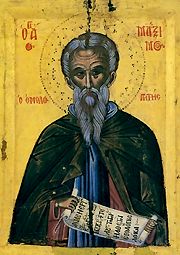One can distinguish five
reasons why God allows devils to attack us:
First, so that from
attack and counter-attack we may become
practised in discerning good from evil.
Second, so that our
virtue may be maintained in the heat of
the struggle and so be confirmed in an
impregnable position.
Third, so that as we
advance in virtue we may avoid presumption
and learn humility.
Fourth, to inspire in
us an unreserved hatred for evil through
the experience we thus have of it.
Fifth, and above all,
that we may attain inner freedom and
remain convinced both of our own weakness
and of the strength of him who has come to
our aid.
-
Centuries on Charity, 2, 67
(SC9,p114.)
Right
Use not Misuse
It is important to
understand the right use of external
objects and pictures of them in our
imagination.
The reasonable use of
them produces for its fruit the virtues
of chastity, charity, and right
knowledge.
The unreasonable use
results in debauchery, hatred, and
ignorance.
It is through the
measure in which we misuse the powers of
the soul, namely its desire, emotion,
reason, that the vices install
themselves: ignorance and folly in the
reasoning faculty, hatred and debauchery
in the desires and emotions. The right
use, on the contrary, produces right
knowledge and prudence, charity, and
chastity.
Nothing that God has
created is in itself bad. Food is not
bad, gluttony is. The procreation of
children is not bad, lechery [driven by
lust] is. Wealth is not bad, avarice is.
Glory is not bad, vainglory is.
So you see nothing is
bad in itself, only the misuse of it,
which is the soul's negligence in
cultivating its true nature.
-
Centuries on Charity, 3, 1 (SC9,p123.)
 Maximus
the
Confessor (580-662 AD), also known as
Maximus the Theologian and Maximus of
Constantinople, was a Christian monk,
theologian, and scholar. He was born in
the region of Constantinople and was well
educated. In his early life, Maximus was a
civil servant, and an aide to the
Byzantine Emperor Heraclius. He gave up
this life in the political sphere to enter
into the monastic life. Around 614, he
became a monk (later abbot) at the
monastery of Chrysopolis. During the
Persian invasion of the Empire (614), he
fled to Africa. He was exiled twice,
tortued in 662 and died shortly after. His
title of Confessor means that he suffered
for the Christian faith, but was not
directly martyred.
Maximus
the
Confessor (580-662 AD), also known as
Maximus the Theologian and Maximus of
Constantinople, was a Christian monk,
theologian, and scholar. He was born in
the region of Constantinople and was well
educated. In his early life, Maximus was a
civil servant, and an aide to the
Byzantine Emperor Heraclius. He gave up
this life in the political sphere to enter
into the monastic life. Around 614, he
became a monk (later abbot) at the
monastery of Chrysopolis. During the
Persian invasion of the Empire (614), he
fled to Africa. He was exiled twice,
tortued in 662 and died shortly after. His
title of Confessor means that he suffered
for the Christian faith, but was not
directly martyred.
[Translation
by
Paul Drake. For more readings see Drinking
from the Hidden Fountain: A Patristic
Breviary, by Thomas Spidlik,
Cistercian Publications, 1994.]